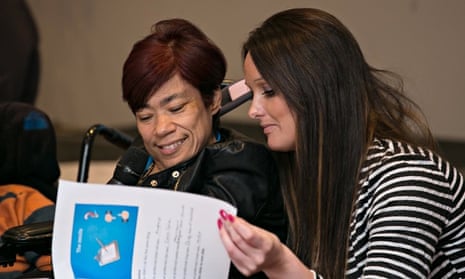I get up at about 5.30am. When I’m ready, I get the children up and dressed in time to drop them at the childminder’s house by 7am.
I’ve worked at FitzRoy as a team leader, supporting people with learning disabilities, for 11 years and I love my work. Before this job I was a personal assistant but it felt wrong because I’m very much a people person. I earn less now than when I was a PA, but the job satisfaction is so much greater and now I get to help people.
The day when one of the residents got a wheelchair that fitted properly after six months of us fighting for it was a wonderful day, and there are many other examples I could give. A lot of my work means refusing to take no for an answer. I’ve learned that if you persist in getting past reception to speak to people who can make decisions, you’re more likely to be listened to.
I get to work at about 7.10am, giving me a bit of time to go through my emails and make sure I’ve caught up with everything before I begin the day. The next couple of hours are spent helping the 19 residents to get up, assisting them with personal care, bathing and taking their medication.
When everyone is ready, the fun begins and we have a range of activities planned each day such as cooking, exercise, music, dance, quizzes, support on the computers and board games. We also spend time managing quite a high range of healthcare needs. Just last month we had 57 healthcare appointments with doctors and hospitals. Two members of staff might need to attend with each resident, and as a team we manage cover as best we can.
My biggest challenge is without a doubt the countless times I hear “no” from local authority departments, and it always seems to be due to a lack of funds. One of our residents is suffering from bulimia, but his GP washed his hands of it and told me: “You can’t help everyone”. We finally had a breakthrough when his social worker raised our concerns with a psychiatrist, and he’s now in line to receive respite care. If he had been a 14-year-old girl he would have been prioritised, but because he’s a 60-year-old man who has had a stroke and has mental health issues, he didn’t seem to be anyone’s priority.
A recent success was helping two of our residents who enjoy going to the football. They couldn’t afford to go and see their football team play so I called the local team in Newhaven to see if they could help and they were brilliant. We now support the two residents to see their local football team every week free of charge; they have lunch with the committee, and help out by handing out programmes and taking money on the gate.
Before I leave work I always say goodbye to everyone, which takes ages. It’s really difficult to leave work behind when I go home and I don’t always switch off. The staff are a tight-knit team and we text each other with updates. Because we care about the people we support, many of us volunteer in our own time, to help the residents go on trips and live more fulfilling and independent lives.
I try to go to the gym before I collect my children from the childminder. It is a great stress release and gives me a chance to collect my thoughts before I pick up my girls at about 5pm and the evening begins.
If you would like to feature in our Day in the Life series, or know someone who would, email socialcare@theguardian.com.
Why not join our social care community? Becoming a member of the Guardian Social Care Network means you get sent weekly email updates on policy and best practice in the sector, as well as exclusive offers. You can sign up – for free – online here.










